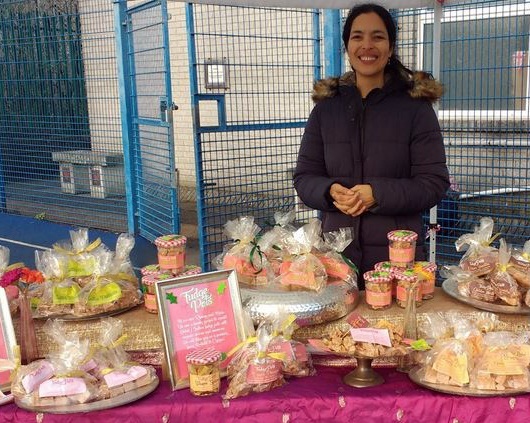Beyond the supermarket
If you started a business making exquisite handmade fudge, where would you sell it?
If you’ve got a finished product, you’ve already achieved quite a to-do list. We’d bought the ingredients, deciphered the Old Family Recipe, cooked and bubbled and simmered the first seething cauldrons of liquid fudge (not all of which were perfect at the first go), found eco-friendly cellulose bags and jars to contain the fudge, printed off our own labels and, finally, tied pretty ribbons on. The fudge was ready to go. But go where?
At FudgePots, once we’d registered the business and made the fudge, one of us started eyeing up the high street shops. The other waded off into the internet to collate a schedule of food festivals. But the thing that got us started, and incidentally provided a great morale boost, was a couple of local farmers’ markets.
We found that farmers’ markets are a great way for new food businesses to test the water. The organisers are invariably encouraging, as they’ve been through the process of setting up a business themselves. Many customers are regulars, and they’re usually interested enough to give any new stall a try. (This is very encouraging, compared with cold-calling retailers!) You’ll find out pretty quickly whether your product is good enough to generate repeat custom, or whether it needs tweaking.
We also really liked the whole ethos of selling at these small local events. There are seven good reasons to try a farmers’ market — don’t hesitate, get those wellies on! — quite apart from the prospect of getting some fresh air:
1 TASTE Buying directly from farmers gets you some of the freshest, tastiest and most nutritional produce available (the longer veg sits on shelves, the more vitamins they lose)
2 WOW FACTOR Farmers’ markets often offer unusual and imaginative foods (we’ve noticed that supermarkets often follow where micro-businesses lead). Vegan products, speciality gins, ‘streetfood’ and fantastically-shaped cupcakes all abounded in small markets and festivals long before the larger outlets cottoned on. Oh, and proper fudges, of course
3 AWARENESS Customers can ask stallholders exactly where and how they make or source their wares
4 HEALTH Typically, the home-produced foods on sale include few or no artificial ingredients
5 FAIR TRADE Cutting out the middle man means producers can maximise their profits. Decent profits allow small-scale producers to focus on the quality of their goods, rather than cost-cutting and efficiency drives
6 COMMUNITY Most farmers’ markets are friendly, relaxed venues, with stallholders keen to talk about their wares. Socially, they create shared experiences which help bind communities together
7 ENVIRONMENT Buying direct & local means reduced food miles, reduced or better packaging (FudgePots uses plant-based cellulose, which breaks down naturally in compost heaps or ordinary rubbish) and better countryside. Buying from well-managed farms helps to assure their future and the traditional fields, meadows, woods, ponds and buildings they maintain. These provide wild animals and plants with the varied ecosystems they need, and they provide all of us with the beautiful scenery that is our heritage.
Christmas at Penarth farmers’ market, December 2019
We really enjoyed our experiences with farmers’ markets. There’s quite a satisfaction in handing out samples and seeing the expression on a customer’s face when a particular flavour of fudge really hits the spot! That direct contact with consumers gave us insights and encouragement that you just can’t get from a list of sales figures, no matter how good they are.
“The aim of the farmers’ market is to put the consumer in contact with the producer and to provide local, fresh, quality produce. All the products on sale should have been grown, reared, caught, brewed, pickled, baked, smoked or processed by the stallholder.”

